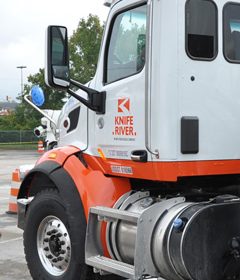Diesel Exhaust Fluid (DEF) for heavy-duty truck emissions treatment systems is made from a mixture of technically pure urea and purified water, and must be handled and stored properly to preserve its quality. This holds for drivers filling up on the road and shops that stock DEF.
|
|
| Heavy-duty truck OEM and body builders have options for mounting the blue-capped diesel exhaust fluid tanks—forward or aft the main fuel tanks among them. PHOTO: Concrete Products>/em> |
On the road, one of the main challenges for drivers is the knowing the brand of DEF they are being sold: Many fill up location bulk dispensers don’t identify fluid manufacturer and brand name, despite regulations in many states that require such information. It is difficult for drivers to confirm they are buying DEF that is licensed by American Petroleum Institute’s Diesel Exhaust Fluid Certification Program unless it is marked. Many diesel engine manufacturers recommend API-licensed DEF for their equipment.
Drivers accustomed to purchasing DEF in containers should look at the expiration on the bottle and be sure to use it before the date as the product has a limited shelf life. If a date is not present, they should ask for the most recently delivered DEF products.
Storage conditions also impact DEF quality. Fluid can be expected to have a minimum shelf life of 12 months or even longer in optimum conditions. Truck operators should check the label for storage temperature range, and API recommends that they don’t store fluid for too long once dispensed—especially if the storage area in the vehicle is routinely hotter than the recommended temperatures displayed on the label.
DEF FOR SHOP USE
API finds that the biggest misconception by fleet managers is the belief that if the urea concentration of their DEF is on spec, then the fluid meets the required quality. While it is absolutely true that the concentration is very important, there are other key quality characteristics built into the ISO 22241, Diesel engines — NOx reduction agent standard.
DEF is composed of 32.5 percent technically-pure urea in pure water. Each component is critical to the manufacture of treatment fluid that meets ISO 22241. Sub-standard urea—such as agricultural-grade product commonly used as fertilizer—or use of water derived directly from the public water system without proper treatment can introduce contaminants and metals that are detrimental to the life of the diesel engines’ Selective Catalytic Reduction (SCR) components, and can also affect the SCR system’s ability to reduce harmful NOx emissions.
Fleet managers should confirm DEF that meets the ISO quality standard. One way to do this is to ensure that their supplier is providing a Certificate of Analysis (or Quality) with every shipment that addresses all of the quality characteristics the specification requires. Fleets and drivers can check to see if the DEF they are buying is licensed through API’s real-time directory of licensees on the Institute website, www.api.org.
MANAGING DEF
Handling, storage and dispensing of DEF for truck shops is very important: Temperatures during transport or at the point of storage or sale can harm the shelf life of DEF sold in containers. Fleet operators should make sure any stock is rotated to use the oldest fluid first. Proper storage temperatures are vital; conditions above 86°F will limit DEF shelf life over time. Some additional things to consider in fluid storage and handing include:
- Bulk tanks should be dedicated for DEF. Don’t switch products before thoroughly rinsing the tank with distilled or de-ionized water or on-spec DEF.
- A closed loop system for transferring DEF from a drum or bulk tank is recommended so contaminants don’t get into the fluid. This is particularly important in a shop or construction site that has dust or dirt in the air.
- Use dedicated equipment for dispensing DEF. Don’t use funnels, pitchers, hoses, etc. that are used for other fluids.
- Anything used for dispensing DEF should be cleaned with distilled or de-ionized water and followed by a DEF rinse. Don’t use tap water for cleaning.
It’s important for shop managers and drivers to know what they are putting into their DEF tanks. The quality of the fluid going into the vehicle is as important as the quality of the engine oils or fuels. Use of API-licensed Diesel Exhaust Fluid will ensure that product meets the high standards required by engine and vehicle manufacturers.
Jeffrey Harmening is Team Lead, Diesel Exhaust Fluid for American Petroleum Institute, Washington, D.C.

